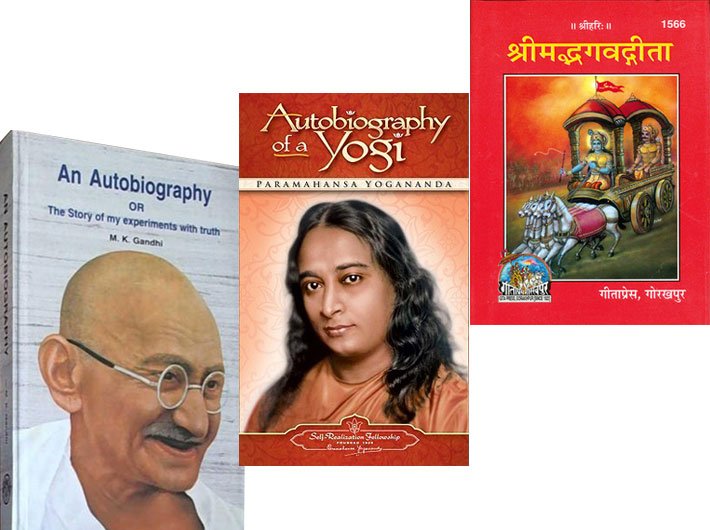Forget preppy romances and mythological thrillers, here are three perennial spiritual classics
There are a few fortunate people for whom every day is a World Book Day, but for the rest it comes once in a year. There are all sorts of international days of this and that, but thanks to social media people are acquiring the habit of wishing and celebrating this or that day these days. Those who’d like to actually read a (portion of a) book in token celebration of the UNSESCO’s World Book Day, we have a suggestion: why not take up one of India’s own best-sellers?
Now, at first you’d think we are talking of Chetan Bhagat & Co. Or Shobhaa De, if you are of certain age. No. India’s perennial best-sellers are in a different league. To our reckoning, they are An Autobiography: The Story of My Experiments with Truth by MK Gandhi, the Bhagvad Gita – especially under the eponymous Gita Press imprint, and the Autobiography of a Yogi by Paramhans Yogananda. These three (and more names can be added to the list) have far outsold Mr Bhagat’s and Ms De’s works, with millions of copies out there.
(Incidentally, the author of the first title has written a commentary on the second title and has a cameo in the third.)
Gandhi’s Autobiography, published originally by his own publishing house, Navajivan Press of Ahmedabad, in the late 1920s, needs no publicity, even as Barack Obama is among the latest to endorse it. Translated in nearly all major Indian languages and many foreign ones, Navajivan itself has sold 43 lakh copies. Now that it is copyright-free, all publishers big and small are bringing out their own editions. Meanwhile, Navajivan has brought out a deluxe edition in Gujarati and English.
Nearly a century later, the Autobiography finally has a critical edition too, if you want to dig deeper. While the book has its own magic, it’s worthwhile to complement it with Gandhi’s own ‘History of Satyagraha in South Africa’ to complete his narrative, and with ‘Hind Swaraj’ to get a better idea of his vision.
Three years ago, when we asked some of the greatest thinkers and writers to name ten books they think are crucial to understand India, Gandhi’s Autobiography was on top of many contributors’ recommendations:
Read: Which books you must not miss if you want to understand India
In this age of increasing intolerance and hardening hatred, more and more youngsters are turning to Gandhi, and that is some cause for hope.
While there are no estimates readily available about the sales of the Gita, there is little doubt that it is India’s number one best-seller after the advent of print in the country. Gita Press, founded in 1923, has done more than any other organisation to make affordable editions available to more and more people. It has brought out the GodSong (that’s what the title means, and that is the title of a recent English translation by Amit Majumdar) in a large number of languages and a large number of formats to go with it, from the very small-size ‘gutkha’ edition to hefty volumes with commentaries. (The Press itself, meanwhile, has backstory of its own: read one here: Press Notes from the Gods Above)
The Gita, a digest and compendium of all wisdom of the Vedas and Upanishads, has inspired many great minds and many of them have written their commentaries on it. The sacred book was a key text of the Freedom Struggle too, as several key leaders shared with us what lessons they learned from the Gita for the nation they were shaping. Tilak, Aurobindo and Gandhi (and several of Gandhi’s Ashram colleagues like Kaka Kalelkar and Kishorelal Mashruwala), to name a few. (In fact, there’s a critical and in-depth study of this phenomenon by political scientist Sanjay Palshikar, titled ‘Evil and the Philosophy of Retribution: Modern Commentaries on the Bhagavad-Gita’. For a brief introduction, try this Seminar essay by him: The Asura and the Gita)
For those seeking solutions to the puzzle called life, nearly every major religious/spiritual leader too has offered a reader-friendly commentary: from Swami Vivekanand and his Ramakrishna Mission colleagues and disciples, to Swami Chinmayanand of the Chinmay Mission to ISKCON founder A. C. Bhaktivedanta Swami Prabhupada. The latter’s ‘Bhagvad-Gita As it Is’ seems to be giving Bhagats and Des a run for their money at traffic junctions even today.
The third book on the list, the Autobiography of a Yogi by Paramhans Yogananda, is also a spiritual title, proving that we are deeply spiritual people after all – notwithstanding today’s headlines. Last year, India’s superstar cricketer Virat Kohli said this book was his inspiration, his secret of success. And like Obama’s endorsement of Gandhi’s autobiography, Kohli too has far bigger predecessors: Steve Jobs, George Harrison, Elvis Presley, and Ravi Shankar, to name a few.


